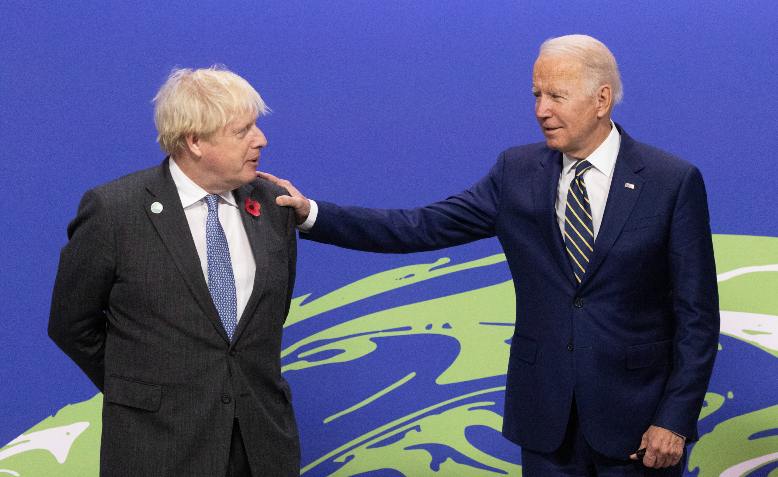 Boris Johnson and Joe Biden, COP26. Photo: Simon Dawson / No 10 Downing Street / Flickr / CC BY-NC-ND 2.0, license linked at bottom of article
Boris Johnson and Joe Biden, COP26. Photo: Simon Dawson / No 10 Downing Street / Flickr / CC BY-NC-ND 2.0, license linked at bottom of article
With world leaders failing to agree to any meaningful action at COP26, Elaine Graham-Leigh argues now is not a moment for despair, but for stepping up the fight
Now that the COP26 summit is over, there’s something of an effort going on to convince us that it wasn’t a dismal failure. Alok Sharma in his closing statement called it ‘a fragile win’, while John Kerry opined in The Observer that ‘we are in fact closer than we have ever been before to avoiding climate chaos’. This might be an expected reaction from the politicians, but many in the scientific community are also heralding COP26 as a step forward, even if it leaves much more to do. Michael Mann, for example, argues that ‘the latest commitments are meaningful and can be built upon’, and that we are at least in a better position than we were before the Paris COP summit in 2015.
In this view, the next twelve months are in fact the crucial period, as countries are ‘requested’ (a key bit of watering-down there from the first draft agreement) to put forward specific plans for emissions reductions, ahead of the next COP in Egypt in 2022. The problem though is two-fold. First, that the position at the moment puts us on a path for over 2C of warming. The hope of keeping warming to 1.5C relies on various countries pledging to do more than they indicated in Glasgow that they were prepared to do. Second, even this ignores the vast gap between pledges and actual action that has been a feature of international agreements on climate change since Kyoto.
The anger and disappointment from campaigners and civil-society groups at the result of COP26 isn’t doom-mongering but a justifiable reaction to the glacial pace of action on the climate crisis. It’s an expression of the contrast between the huge, vibrant movement on the streets of Glasgow and the leaders in the COP moving with all the speed of two cats having a stand-off, too worried about their rival gaining an advantage to do anything.
While we’re being encouraged to see Glasgow as a small but significant advance on the Paris COP six years ago, for many of us, the lack of decisive action makes it feel more akin to the failure of the Copenhagen COP back in 2009. There is however a crucial difference. Copenhagen represented something of a defeat for the climate movement and heralded a period of more muted activity. Glasgow, on the other hand, has felt like a step towards building a mass movement of working people, in particular through the solidarity between climate protesters and striking workers. In many ways, we’re coming out of this in a better position than our leaders are.
It is true that Glasgow was a landmark in its recognition of the climate threat. This however puts world leaders in a worse position than before. It’s one thing not to take the climate crisis seriously; it’s quite another if they accept the seriousness of the crisis but are unable to do anything about it. If governments around the world can’t address what they themselves are now agreeing is an existential threat, then really, what are they good for? Small wonder that Alok Sharma was reduced to tears.
We knew going into COP26 that we weren’t likely to get anything meaningful out of it. After all, even if the talks had produced a ringing endorsement of measures to keep warming to 1.5C, that wouldn’t guarantee that those measures would be enacted. The task remains what it has always been, to get measurable, specific actions to transform our energy, transport, heating, and so on to reduce emissions. To do this, we need a movement on the streets with specific demands and the willingness to take on the government to achieve them.
We’re coming out of Glasgow with an emboldened, strengthened movement, facing a government that’s just made clear to the entire world that it isn’t fit for purpose. This is certainly not a moment for despair, but for stepping up the fight.
Fund the fightback
We urgently need stronger socialist organisation to push for the widest possible resistance and put the case for change. Please donate generously to this year’s Counterfire appeal and help us meet our £25,000 target as fast as possible.

